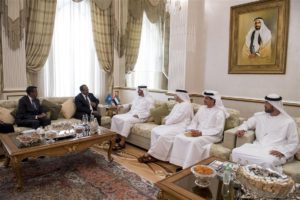By Sharmake Farah
Background
The purpose of this essay is to provide policymakers a contextual background on the bilateral ties between Somalia and UAE, and advise them with a range of policy options to address UAE’s bellicose behaviours and its continued interference in Somalia’s internal affairs without sending relations into downward spiral.
 Diplomatic ties between UAE and Somalia froze following when Somalia’s central authority collapsed and descended into years of civil unrest. During the course of that period, relations between the two nations were based on mutual interests, largely on commercial grounds. Dubai ports and banks have increasingly become important hubs, in terms of, import, export and banking services, for Somalia’s businesses. This doesn’t mean, however, that UAE is our major trading partner: it only accounts sixteen per cent of Somali export (largely charcoal, which banned by the UNSC resolution 2036). Saudi Arabia is our number one trading partner: 37 per cent of our export commodities are bound for Saudi markets (largely Livestock), followed by Oman, which is around 22 per cent and growing each year at a considerable pace.
Diplomatic ties between UAE and Somalia froze following when Somalia’s central authority collapsed and descended into years of civil unrest. During the course of that period, relations between the two nations were based on mutual interests, largely on commercial grounds. Dubai ports and banks have increasingly become important hubs, in terms of, import, export and banking services, for Somalia’s businesses. This doesn’t mean, however, that UAE is our major trading partner: it only accounts sixteen per cent of Somali export (largely charcoal, which banned by the UNSC resolution 2036). Saudi Arabia is our number one trading partner: 37 per cent of our export commodities are bound for Saudi markets (largely Livestock), followed by Oman, which is around 22 per cent and growing each year at a considerable pace.
While Somalia suffers perennial trade deficit with UAE, it has grown increasingly reliant on its business infrastructures, in particular, Dubai Ports (DP) and banks. The latter, (Dubai Banks) facilitate and process around $1.3 billion of remittances money from diaspora communities to Somali families living inside and outside the country. Whereas the former, (Dubai Ports) serve as a transit point for most of our export commodities bound for China, India, and among other destinations. Thousands of Somalis from both the diaspora and otherwise (with limited rights), have made Dubai and surrounding regions as their permanent residences, resulting in booming investments in real estate and hospitality industries despite now subdued by the 2008 Global Financial Crisis. Assuming that the number of Somali citizens living in UAE is hovering around twenty thousand, exact figures of how many of who have Somali passports are not clear however.
UAE interests in Somalia
Setting that aside, UAE’s interest in Somalia took a quick turnaround and became a foreign policy priority following September 2001. During which it established contacts with a handful of Somali actors to get a sense of what’s happening on the ground and how that may affect its interests. Concerned with the spread of terrorism, human trafficking, and upsurge of piracy activities across the Indian Ocean disrupting commercial shipping lanes, UAE contracted in 2009, Sterling Corporate Services, Saracen International (a South African private military firm), and Eric Prince, the former head of the notorious Blackwater Worldwide to train and arm Puntland Maritime Police Force. To date, UAE maintains contacts with PMPF, bankrolls it through Sterling Corporate Services, and it further cemented its position in Puntland region in additional infrastructure investments.
Not only did UAE’s antipiracy mission attract international condemnations for breaking UNSC arms embargo resolution 733, which was in place since 1992, but it has increasingly become impervious to such condemnations. Strengthening and accelerating even further at its unilateral zero-sum clandestine operations in Somalia with little or no regard to international norms. Its new military deployment in Berbera is one case in point. Yet, UAE claims frequently that it is protecting what it deems necessary strategic and economic interests.
UAE’s illegally acquired military base in Berbera risks sucking Somalia into the Yemen conflict: a conflict that it’s not involved. Not only does Somalia recognise the internationally recognised Hadi government based in Aden, but it abhors the Houthis’ intention to seize power through violence, and calls all sides involved in this conflict to settle their differences through dialogue. That said, Somalia should demand from UAE to stop using its territory as a staging post for the Yemen conflict, and should call the closure of that illegally acquired military base in Berbera.
Read more: Managing Somalia’s stressed diplomatic relations with UAE
Sharmake Farah
Public policy analyst
Email: [email protected]
We welcome the submission of all articles for possible publication on WardheerNews.com. WardheerNews will only consider articles sent exclusively. Please email your article today . Opinions expressed in this article are those of the author and do not necessarily reflect the views of WardheerNews.
WardheerNew’s tolerance platform is engaging with diversity of opinion, political ideology and self-expression. Tolerance is a necessary ingredient for creativity and civility.Tolerance fuels tenacity and audacity.
WardheerNews waxay tixgelin gaara siinaysaa maqaaladaha sida gaarka ah loogu soo diro ee aan lagu daabicin goobo kale. Maqaalkani wuxuu ka turjumayaa aragtida Qoraaga loomana fasiran karo tan WardheerNews.
Copyright © 2024 WardheerNews, All rights reserved


